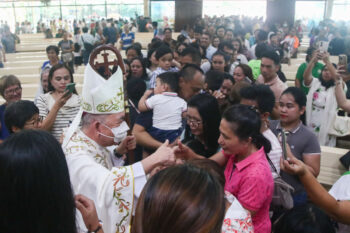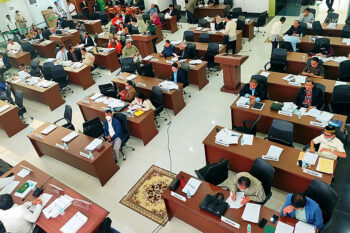GENERAL SANTOS CITY (11 July) — It would have been different if…
More than a week after she displayed a temper she has since regretted by saying it was not her best moment, a feisty Davao City Mayor Sara Duterte continues to be the subject of opinion writers, both adverse and in her favor.
It didn’t help that her father Vice Mayor Rodrigo Duterte, incensed at the incessant attacks on his daughter, joined the fray by publicly defending the beleaguered mayor after initially begging off from making comments on the controversial punching incident of a court sheriff by Sara. Even flashing a dirty finger sign over television.
Both acts, Sara’s punching of the court sheriff and her father’s sock-it-to-them finger gesture, are no doubt offensive to established norms.
But you cannot entirely fault the father for coming to the rescue of her daughter who anchored his arguments on the legal grounds that were sadly lost in the heat of passion and emotion.
The father, a former prosecutor, certainly did his homework when Sara was wrongly criticized for interfering with a court order. He argued that when public order and safety becomes an issue, the local chief executive has all the powers to assume jurisdiction. It is no different from the president of the land assuming jurisdiction over a labor case that involves ‘national interest’, an executive power he may directly exercise or delegate to his labor secretary.
That is how the law is written, fairly or unfairly.
So is the Urban Development and Housing Act of 1992, which outlines circumstances where demolition of shanties and illegal structures, issued upon orders of the competent court, can proceed legally.
The mayor was informed beforehand that the demolition order will be implemented. She said they had planned beforehand how to proceed with it. And one of the things she requested was for her to be present when the demolition starts. It did not happen.
The father further dropped the bomb when he said the 30-day notice was not followed by the court sheriff. That grace period was to give aggrieved parties time to seek legal remedies, one of which was to file an appeal before the Court of Appeals and seek for a temporary restraining order which the lawyer of the property occupants did.
Suffice to say, court sheriff Abner Andres may have acted with due but uncalled for haste.
Oftentimes, the danger and pitfalls of issuing statements and making opinions lie in lack of appreciation and context of one event or series of events.
That majority of Davao residents, as now it seems, are fully in support of Sara should be looked into and analyzed why this is the case.
Yes, it would have been different if it was the father who publicly punched the sheriff which is unimaginable for a savvy veteran politician. Even more so if it was Sara’s younger brother who is even more short-tempered and has a history of violently attacking somebody who caught his ire.
You certainly cannot fault Davaoeños for lacking in sense of justice and human rights defenders.
Davao was once a center of political violence of all shades in Mindanao if not throughout the country.
And if there are residents that are quick to condemn any forms of human rights violations and to denounce political warlordism, Davaoeños are high up the ladder.
But as there are contexts on why residents of Davao are acting and reacting the way they are now, it is because they are finding comfort and safety in the leadership of the Dutertes in Davao City.
True, while unexplained and unresolved killings of known criminal elements have been one of the characters of their administrations, the Dutertes hardly represent the typical and quintessential warlords that human rights groups and political observers are accustomed to.
They have never violently run after their political opponents. They just ran over them during elections.
The father certainly cannot be accused of being power hungry. At least three presidents have publicly and privately offered him a cabinet position, all of which he also publicly declined.
How we wish somebody writes a story of the rise to political power in Davao City of the Dutertes and why they did. (Edwin G. Espejo writes for www.asiancorrespondent.com)






